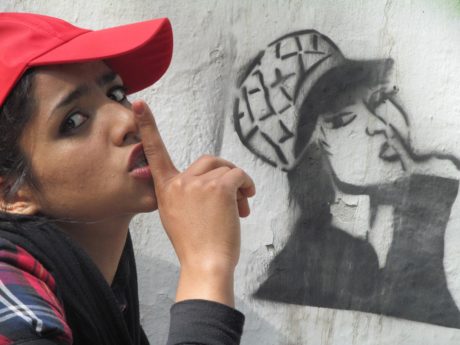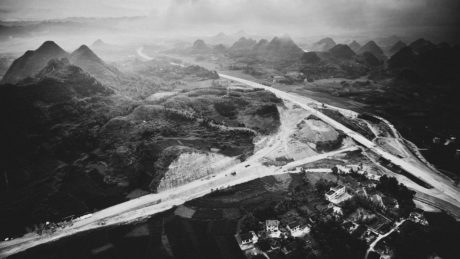One of my favorite strategies for navigating the sheer volume of films in a packed festival is to, on at least one day, let the screening committee do my work for me and put myself in one theatre for the day and see whatever screens there. Part 2 of my coverage is all about E Street Cinema’s Theatre 7. #WellDoneScreeningCommittee

I admit it that my one act of personal curation in choosing Theatre 7 was this film, Sonita, about a rapping teenaged Afghani immigrant living in Iran (if you are a fan of No One Knows About Persian Cats you should be).

Rokhsareh Ghaem Maghami told the audience that when she first got to know Sonita, who wished her parents were Michael Jackson and Rihanna (the first thing that we see Sonita doing is pasting a photo of her face over a Rihanna concert photo), she thought she was making a dark documentary about a teenager without a future. And when Sonita’s mother arrives from Herat (Afghanistan) intent on marrying her and getting a bride price that would enable her brother to pay his bride price, it does seem like this bright, feminist flame of a girl with ferocious lyrical game was going to be snuffed out. No amount of talk from anyone in Iran, including the head of the Center where Sonita worked as a janitor, was going to convince Sonita’s mother to drop the idea of selling her daughter. But then Sonita asks the camera, and by extension the person holding the camera, whether or not she could pay the money the mother had requested (the equivalent to $2,000) for a six month respite and the story begins to change.
Maghami admitted that she did not feel comfortable being on camera, but that the stakes for Sonita was so high that it was worth it to stop pretending that they were letting this story happen in front of them and begin to take part (a moment presaged early in the film when Sonita turns the camera on her filmmaker).
In a film that is already telling an incredible story, the filmmakers themselves join the story and how can you possibly not want them to rescue this girl from a life of crushing poverty and beatings, among other horrors? But Maghami is such a skilled, aware filmmaker that her action, beyond its obvious humanitarian value, falls into a glorious tradition of meta-filmmaking in Iranian cinema, it immediately conjured Abbas Kiarostami’s Close-Up, a documentary re-creation by a Kiarostami of the time some guy convinced a family he was Kiarostami.
By acknowledging that a documentary filmmaker can only ever pretend to be “letting something happen” in front of the camera, and sticking with Sonita to enable her dreams (and indeed beyond her wildest dreams – spoiler alert, this story actually does have a happy ending), she makes the best movie she can and does the best for Sonita and we are all better for Maghami’s personal and artistic choices (just check out music video of “Bride for Sale” below that she helps Sonita make).
Sonita is a textured examination of women in Persian culture and in Afghanistan that pulses with anger at the way women are in those cultures. It’s a stunning document with a legit happy ending and some great Persian rap. Must see.
____

Well, The Road is not going to win any prizes for its visual style (though that production still is out of control good and there is a moment very late in the film featuring a multi-colored umbrella on a small crane against a wintry backdrop that is hard to beat). It really ought to win prizes for its holistic examination of the many layers of entrenched corruption that it reveals in covering the building of one particular stretch of the Xu-Huai Highway that runs through Hunan Province, a complex and corrosive system of corruption that is hollowing out popular support for the regime.
Zhang Zanbo’s film opens with what seems like a typical story about a horrible private company, in this case the Loudi Road and Bridge Company, which bullies the locals into silence when promises of payment for damages are not fulfilled and which systematically deprives its workers of anything that could resemble rights or payment, specifically through the machinations of a local fixer called Mr. Meng. But the layers of corruption at work here are so much more multi-faceted than that of some private companies running amok, drunk on money and power dispensed by the central government as part of its enormous stimulus campaign during the financial crisis ($586 billion or so, what pundits might refer to as “real money”).
Zhang Zanbo guides us through each level of work on this part of the road by focusing on particular groups of stories from the locals, the laborers, the fighters (the members of the company who were assaulted by gangsters hired by the Road Bureau, that’s part of the government, yeah, you read that right), and the singers, who are part of the plainly failing propaganda machine. This provides us with a rich portrait of the ways that the central governments money works its way back into the government, all enabled by a system of staggering informality. Workers are hired with promises, contracts barely exist, permits are demanded months after work begins, inspections happen after massive sections of bridge have been built, no engineer provides any form of documentation of their work and their primary source of income is not their salary, but the steady stream of red envelopes they receive from the construction company to do or not do their jobs, it is never entirely clear which and at this point I don’t think those inspectors or engineers know either.
Officials and construction company members have become so certain that their behavior is in no way exceptional, no attempt is ever made to hide the passing around of red envelopes that actually pay the salaries of the government inspectors. The relationship is not cozy, far from it, but it’s not hard to see why the government of China is so terrified of its citizens; they know quite well that they are losing the consent of the governed at alarmingly high levels and thanks to The Road, we get first hand opinions of several of the workers who openly wonder how long the Communist Party can survive (with a camera in the room!). This is an incredibly important document that puts this system on full display (it, uh, has not been screened in China) and demonstrates just how tenuous the Communist Party’s hold on their citizens hearts and minds has become.
____

in the shadow of the hill, on the other hand, should win many awards for its lush visual style and its intimate street level POV camera work that puts you inside the Rocinha (pronounced more like Hocinya) favela, which is on a hill between Rio’s two wealthy suburbs. Dan Jackson, a laid back Aussie who showed up for his Q&A in shorts and a pair of flip flops, leveraged the crap out of a Phantom drone and a GoPro to produce some really stunning aerial shots of the slum clinging to the sides of this jungle capped hill (see above).
The hook for in the shadow of the hill is the disappearance of a popular bricklayer named Amarildo de Souza during the police “pacification” campaign (a chillingly military phrase for a police operation) in the favela in the years leading up to the World Cup and the Olympics. When the police occupied the favela in 2011 it was an effort to take the area back from the traffickers, but what the community discovered was that the police would simply abuse and disappear the citizens of the favela in their pursuit of pacification. Amarildo’s tenacious family simply would not let him vanish into the night, though, eventually triggering mass protests and the conviction of 13 officers complicit in Amarildo’s murder and torture. Jackson goes to great lengths to get beyond this hook and to really explore the pulsing community life of Rocinha and the vivacious forms of cultural protest that fomented in the streets. One of his community connections is the woman behind Lady Passionfruit, an incredibly bombastic performer of overt comic sexual clowning as an act of protest, a character born of the desperation of a local healer whose house had been torn down by the government. Another community actor is Aurelio Mesquita and his stunning performance of the “Via Sacra,” a Passion play that follows the stations of the cross in the streets of Rocinha. Aurelio is not connected directly with Amarildo’s family, but his performance of the Passion is exactly the kind of heart-felt DIY grassroots blood and guts and give it your all theatrical art that so many in the United States dream of making and despair at accomplishing for lack of resources. But Aurelio’s sheer belief in the necessity of washing Jesus’ story in the tears of Rocinha, acting out, literally, protest sustains him and his many actors, who turn the Via Sacra into a celebration of life in the favela, even as it protests the oppression of the police.
I was prepared for in the shadow of the hill to be such a heart-wrenching story of dug in corruption and brutality that I could not watch the Olympics in good conscience and that I might feel dirtier than I already did for enjoying the World Cup and while that feeling is still there in the background because those two events are so corrupted by money and politics at this point (Aurelio has some choice words for FIFA in this film and he speaks for millions when he says “Go fuck yourself, FIFA”), but . . . Michele, Amarildo’s niece, concludes from this whole affair, in which her family was joined by upper class protesters to tell his story to the world, in which the police involved were arrested and convicted (‘sup Baltimore), that there is justice in Rocinha. It is a struggle and it is slow and a little bit crooked, but it exists and that 20 years ago, no one would have cared about a black body in the favela. This extraordinary woman’s ultimate message for the world is to remember that everyone is human first. I, for one, could not agree more and I hope that more people get to see her story and Dan Jackson’s wonderfully vibrant documentary about a strong community in the shadow of the hill.
AFI Docs continues through tomorrow, Sunday, June 26, 2016. You can still buy tickets and passes.
LINKS:
A Report on ‘AFI DOCS’ Part 1: ‘Zero Days’, ‘Tempestad,’ and ‘Haveababy’ by Erin Teachman.
A Report on ‘AFI DOCS’ Part 2: ‘Sonita,’ ‘The Road,’ and ‘in the shadow of the hill.’





